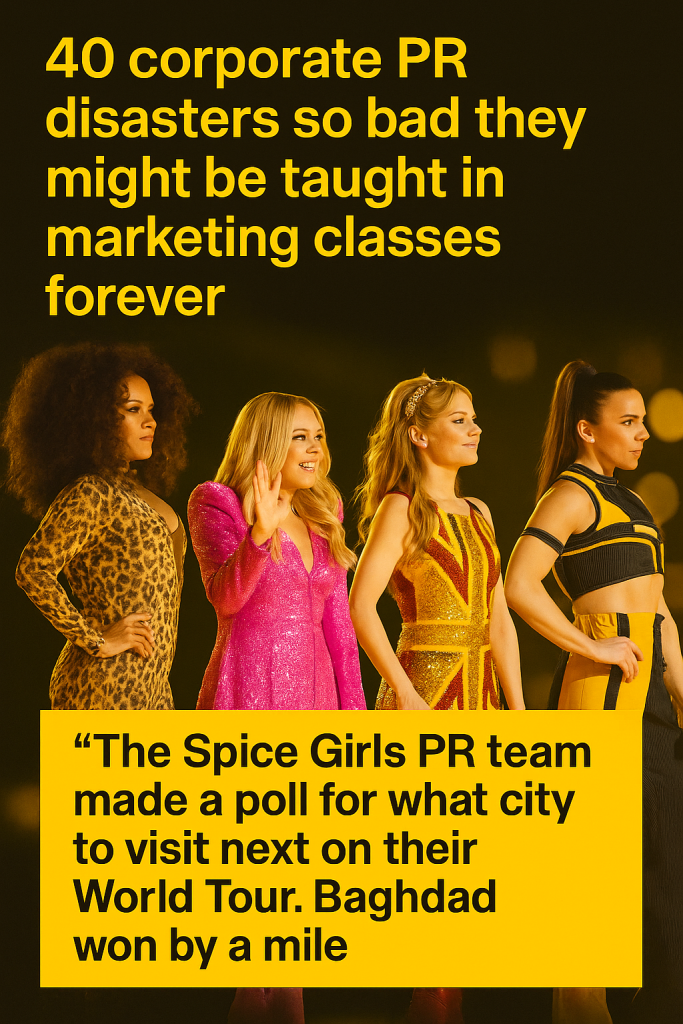In the fast-paced world of public relations, even the most seasoned teams can misstep — sometimes spectacularly. The year 2024 has already seen an array of corporate PR blunders so significant that experts believe these cases will become staple teaching material in marketing and communications courses worldwide. From ill-conceived social media polls to poorly judged public responses, these failures offer critical lessons on how not to handle a brand’s public image.
Among the most talked-about missteps this year was a seemingly harmless initiative launched by the PR team behind the Spice Girls reunion tour. In an attempt to engage fans, the team created an online poll asking followers to vote for the next city the group should visit. What should have been an interactive fan engagement exercise instead backfired dramatically.
Critics point out that the poll, while intended to boost excitement and involvement, did not account for demographic sensitivities or regional controversies linked to certain cities. This oversight led to a backlash from fans and local communities, who felt the campaign was tone-deaf and dismissive of ongoing social issues. The PR team faced swift criticism for not foreseeing the potential pitfalls of such a broad public poll, turning what was meant to be a playful gesture into a cautionary tale.
This high-profile Sponge-worthy blunder is just one entry on a growing list of 2024’s corporate PR disasters. Analysts have compiled an extensive catalog of 40 major mishaps, each illustrating unique ways companies have faltered in their communication strategies. From tech giants mismanaging data privacy announcements to consumer brands botching responses to product recalls, the scope of these disasters is both broad and revealing.
Several common themes emerge among these failures: lack of empathy, insufficient understanding of the audience, and rushed or poorly thought-out messaging. In a digital age where social media accelerates the spread of information — and misinformation — brands have less room for error than ever before. What takes minutes to share can take months, if not years, to fully recover from.
One standout example includes a major retail chain that faced intense backlash after a promotional campaign inadvertently excluded key cultural groups, sparking widespread criticism and calls for boycott. Another notable incident involved a popular beverage company whose spokesperson made controversial statements during a live event, forcing a swift corporate apology and damage control.
Marketing educators are already integrating these real-world cases into their curricula. By analyzing what went wrong, students and future PR professionals can better understand the importance of thorough audience research, transparent communication, and culturally sensitive messaging. Each disaster serves as an irreplaceable case study in crisis management, brand reputation, and the evolving power dynamics of consumer engagement.
As brands continue navigating an increasingly complex media landscape, the 40 PR disasters of 2024 offer a vivid reminder: in a world hyper-connected by digital platforms, no mistake goes unnoticed. The lessons learned from these episodes will not only influence how companies craft their messages but also how they anticipate and respond to public feedback — essential skills for building and maintaining trust in the modern marketplace.
In conclusion, whether it’s a fan poll gone wrong or a more severe corporate misstep, these PR failures underscore a timeless truth in marketing: effective communication is as strategic as it is meaningful. The stories of 2024’s PR disasters are guaranteed to resonate in classrooms and boardrooms alike for years to come.



